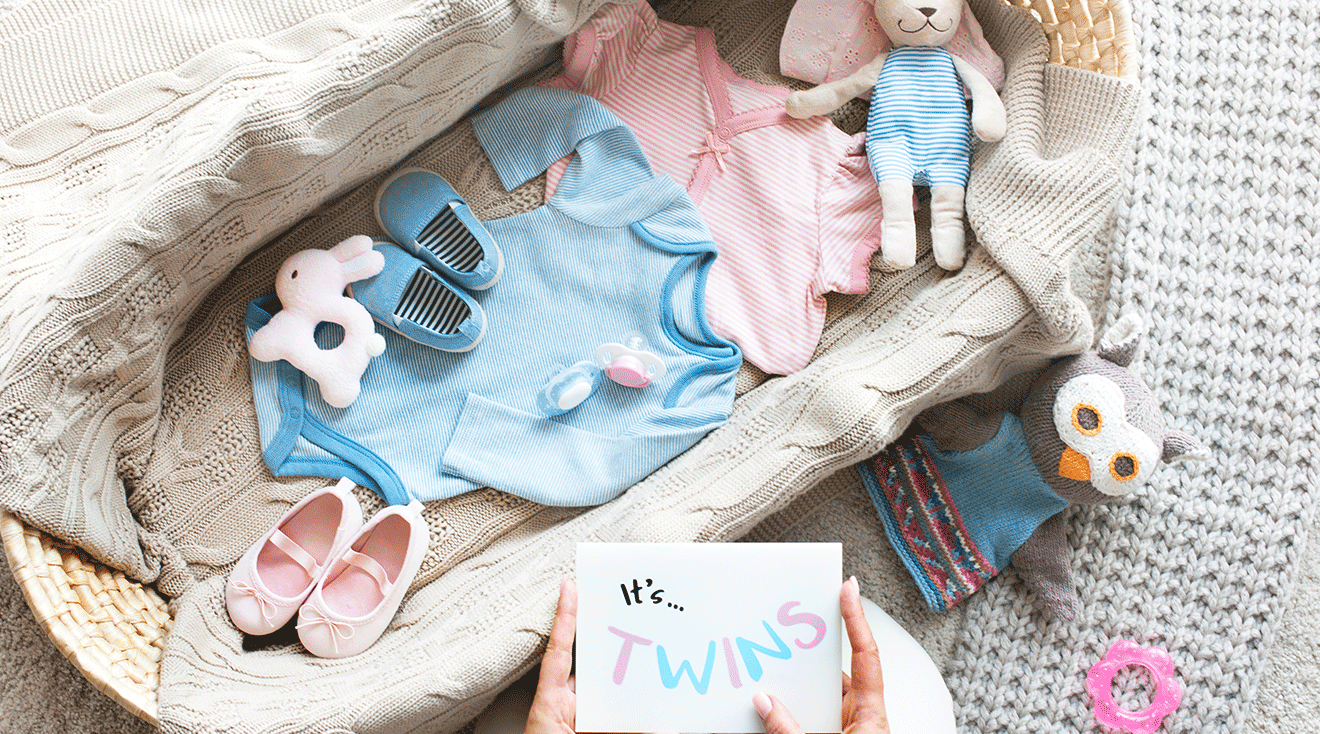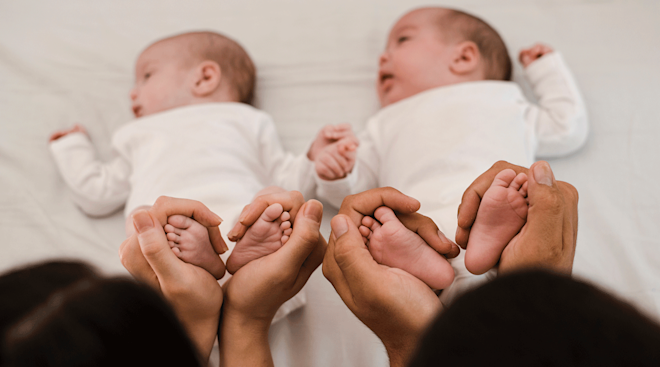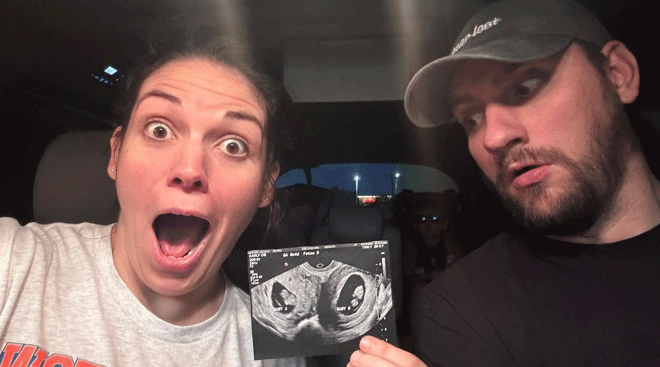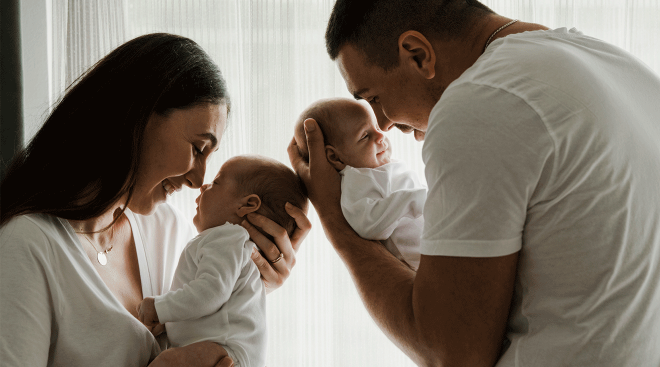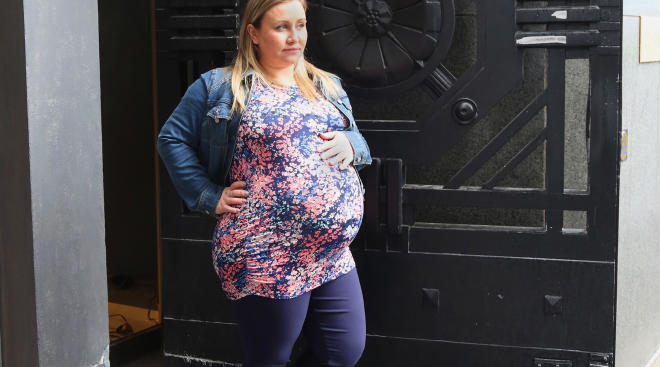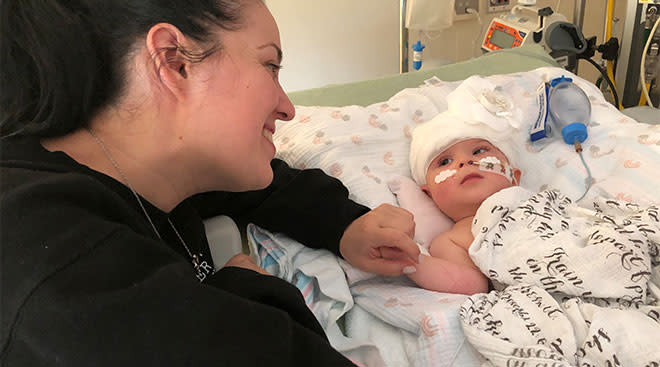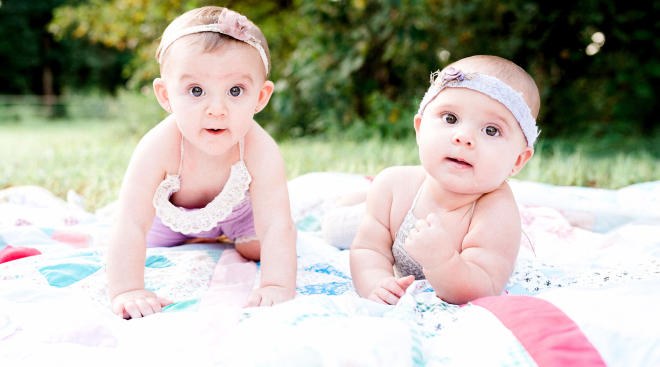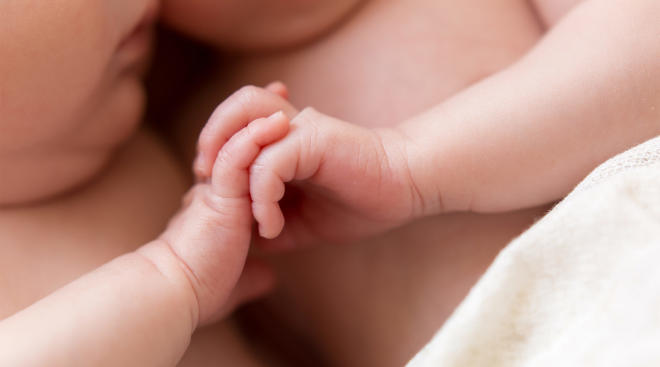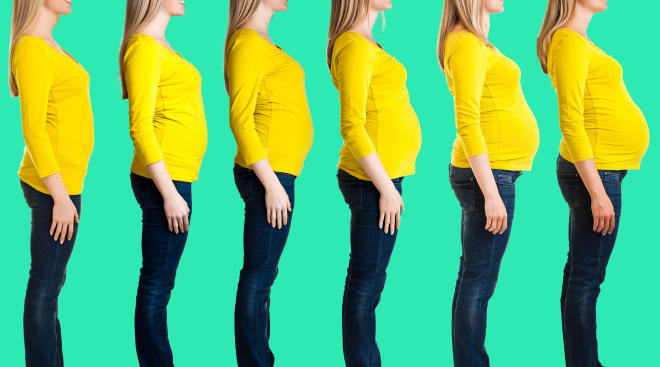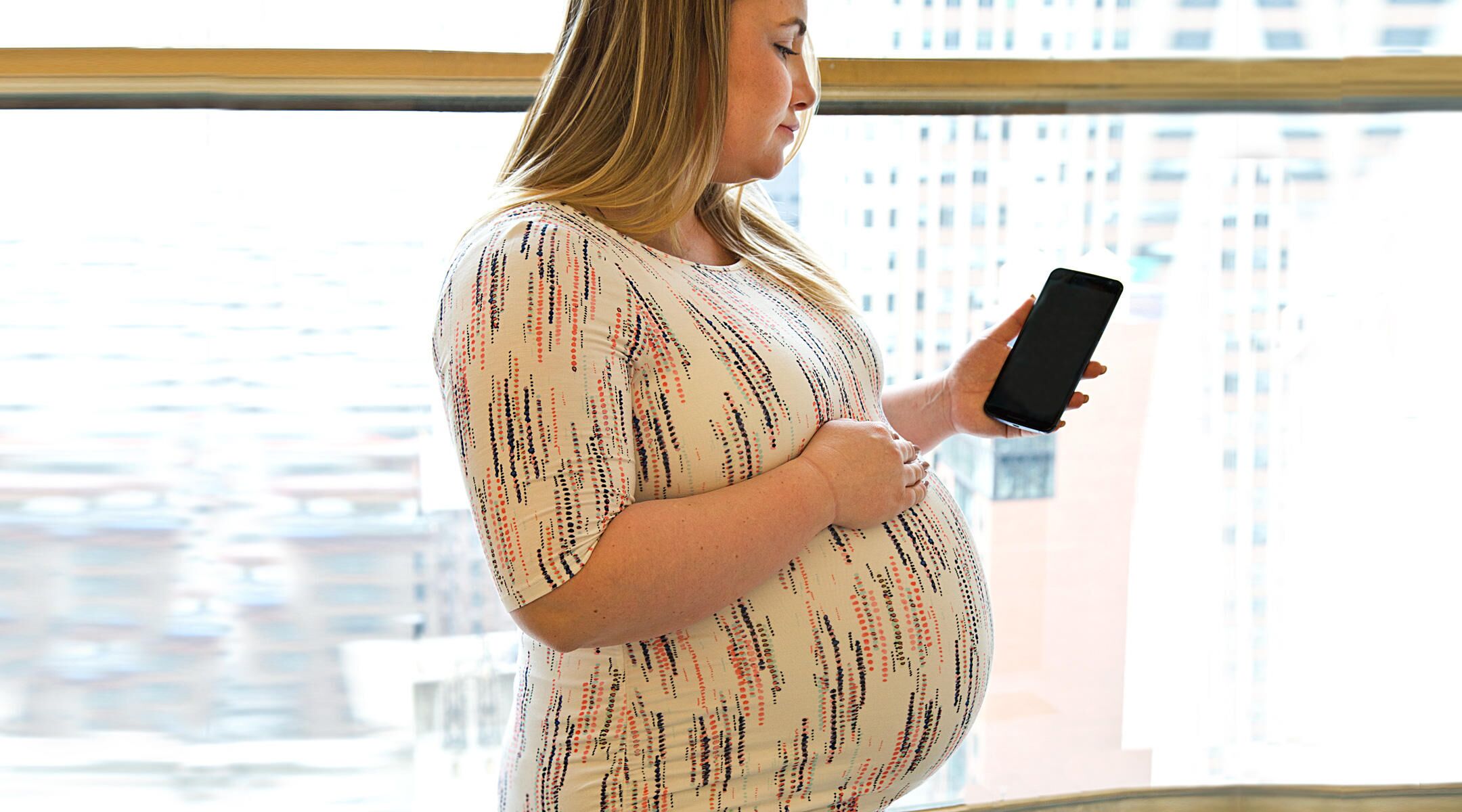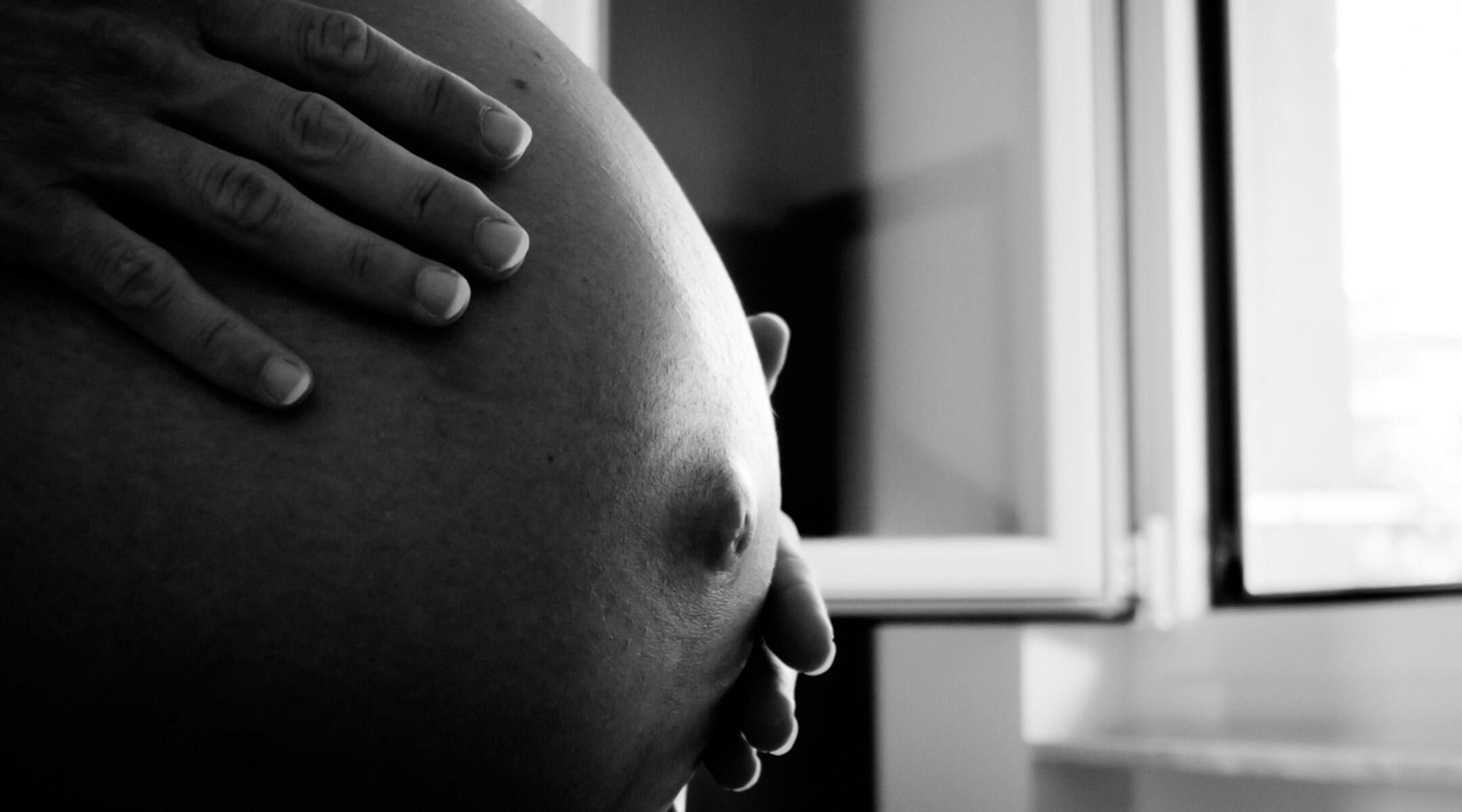Everything to Know About Your Twin Pregnancy
Growing one new human inside your body is a pretty big deal—growing two is even bigger (and no, we’re not just talking about the size of your belly!). Undoubtedly, being pregnant with twins can be exhilarating, exhausting and a little scary all at the same time.
In need of a quick refresher on how twins happen? Either a fertilized egg splits in half and creates identical twins, or two different sperm fertilize two eggs at the same time to create fraternal twins.
If you’re looking for some expert input on your twin pregnancy, read on for everything you need to know—from what symptoms you can expect to how you can plan for a twin delivery.
The early signs of twin pregnancy are generally the same as they are for a singleton pregnancy, but they can come on stronger, says Alyssa Dweck, MD, ob-gyn and women’s health expert for Intimina. Because human chorionic gonadotropin (hCG) levels can rise higher with a twin pregnancy, Dweck says some of the most common early pregnancy symptoms—like nausea, breast tenderness and fatigue—can feel more intense if you’re pregnant with twins.
For the most part, the symptoms you’ll have as an expectant twin mom aren’t that different from those of your friends who are pregnant with one baby. But again, you might feel the same pregnancy symptoms more intensely. And you might experience symptoms earlier in the first trimester than you would with a singleton pregnancy, notes Kyle Graham, MD, an ob-gyn at Pediatrix Medical Group in San Jose, California.
Symptoms of nausea and vomiting can be severe in the first trimester, even resulting in a condition called hyperemesis gravidarum, Graham says. “Sometimes symptoms of pregnancy occur sooner than expected because the pregnancy hormone levels rise higher and faster in twin pregnancies,” he adds.
You can expect any of the following general signs of pregnancy during a twin pregnancy, according to the Children’s Hospital of Philadelphia:
- Fatigue
- Sore and swollen breasts
- Nausea and vomiting
- Frequent peeing
- Food cravings and/or aversions
- Bloating
You could also experience the following twin pregnancy-specific symptoms:
- More weight gain than expected, especially in early pregnancy
- Feeling fetal movements in different parts of the abdomen at same time
To confirm your twin pregnancy, your provider will most likely perform an ultrasound. It might be a transvaginal ultrasound if you’re less than 12 weeks pregnant, or an abdominal ultrasound if you’re past the first trimester, explains Cleveland Clinic.
There are other tests that could show signs of twin pregnancy. High levels of hCG during a blood test could indicate twins, although hCG levels vary so this shouldn’t be used as the only indicator. The results of an alpha-fetoprotein test (AFT) could also show a twin pregnancy: The AFT measures the amount of a specific protein produced by a growing baby’s liver and detected in Mom’s bloodstream, according to Stanford Medicine. If you have twin babies growing, you’ll have a higher level of this protein.
While a twin pregnancy is twice the joy, it can also be harder on your body and there’s a higher risk of certain complications. “Some of the most important differences include the risk of having a preterm delivery, the risk of having a Cesarean section and let’s not forget the postpartum period where the patient will be managing two newborns,” Graham says.
Later on in your pregnancy, you might also need extra prenatal testing, including a biophysical profile, which includes an ultrasound and a nonstress test (a test that measures baby’s heart rate in response to movement), Graham adds.
Weight gain and caloric intake recommendations are higher for a twin pregnancy than for a singleton pregnancy, says Dweck, and you may need to increase your folic acid intake too. In general, women who are carrying twins are encouraged to gain about 35 to 45 pounds, according to the American Pregnancy Association (APA), although you should check in with your provider for your individual plan. According to the American College of Obstetricians and Gynecologists (ACOG), pregnant women expecting twins should aim to eat an extra 600 calories per day (300 for each baby).
Potential complications of a twin pregnancy
Generally speaking, a twin pregnancy is considered higher risk than a singleton pregnancy, says Dweck. According to ACOG, some of the potential complications include:
- Preterm birth (more than half of all twins are born preterm, or before 37 weeks)
- Gestational diabetes
- Preeclampsia, or high blood pressure in pregnancy
- Growth problems for baby
- Twin-twin transfusion syndrome, a rare but potentially serious complication that ACOG says occurs when the blood supply between the twins becomes unbalanced
- Postpartum depression
It’s important to remember that even though your twin pregnancy is considered high-risk, that doesn’t mean you’ll definitely have complications. Many women expecting twins have healthy pregnancies, complication-free deliveries and go home with healthy newborn twins. Regular prenatal care during your twin pregnancy can reduce the risks for complications.
Curious what to expect from your twin pregnancy week by week? Here’s a detailed breakdown.
Weeks 1 to 13: First Trimester of Twin Pregnancy
Before you even realize you’re pregnant, your twins have formed in your uterus, either as the result of one divided fertilized egg (identical twins) or two separate fertilized eggs (fraternal twins), says ACOG. At this point, you might get an at-home pregnancy test or an early ultrasound.
Your provider may also give you an ultrasound to determine the chorionicity of your twins, or whether they share a placenta, according to ACOG. Whether your twins are monochorionic (share a placenta) or dichorionic (have separate placentas) will dictate how many extra ultrasound scans you’ll need throughout your pregnancy. Providers will typically want to scan monochorionic twins more frequently.
Because a lot of hormones are required to fuel a twin pregnancy, you might have some pretty intense symptoms in the first trimester; nausea and vomiting might come on stronger, reiterates Graham. You might also experience symptoms like breast tenderness and weight gain sooner. In general, women carrying twins should expect to gain about 4 to 6 pounds in the first trimester, says the APA.
Weeks 14 to 27: Second Trimester of Twin Pregnancy
Just like in a singleton pregnancy, in the second trimester your provider will perform your anatomy scan, usually between 18 and 22 weeks. In a twin pregnancy, this ultrasound is used to see whether the size of the twins is similar, or “concordant,” says Graham. Starting in the second trimester, you might also have ultrasounds every four to six weeks, says ACOG.
Research says that gaining weight in the second trimester of a twin pregnancy is particularly important for fetal growth. During the second and third trimesters, twin moms should aim to gain about 1.5 pounds per week, according to the APA. That puts your second-trimester weight gain at around 20 pounds. Remember, though, that everyone’s body is different: Your provider can help you determine your ideal weight gain.
It’s also important to stay moderately active in the second trimester. Graham says twin moms can start feeling pretty uncomfortable toward the end of the second trimester, and balance can become an issue. He recommends doing stretches and deep-breathing exercises, as well as working with a physical therapist if necessary to keep your body flexible and relieve aches and pains.
Weeks 28 to 40: Third Trimester of Your Twin Pregnancy
By the third trimester with twins, you’re likely pretty over it—but at least you’re in the home stretch! According to Johns Hopkins Medicine, most twin pregnancies are delivered around 36 weeks—so by the time you’re at 28 weeks, you might only have eight weeks to go.
With that in mind, the beginning of the third trimester is the time to start planning for delivery, says Graham, since it’s very likely you’ll be delivering before your due date. “Things to talk about with your doctor include planning for vaginal delivery versus Cesarean section and what circumstances would require a Cesarean delivery,” he says. “Sometimes the second baby can be breech and it’s important to ask your doctor how delivery of a breech second baby will occur.”
Your provider will continue monitoring your twin pregnancy via extra ultrasounds and other extra testing such as nonstress tests.
If you’re having monochorionic-monoamniotic twins (identical twins that share a placenta and amniotic sac), your twins should always be delivered via C-section “to avoid umbilical cord complications for the non-presenting twin at the time of the first twin’s delivery,” says Brigham and Women’s Hospital. This also applies if you’re otherwise at a high risk of complications.
But a twin pregnancy in and of itself doesn’t always necessitate a C-section, says Brigham and Women’s Hospital, and Dweck adds that many twin moms do deliver vaginally. The optimal delivery method depends on the type of twins, fetal positions, gestational age, fetal size and more. Just like with a singleton pregnancy, your provider will work with you to create a birth plan you’re comfortable with.
Having twins is a very different experience from a singleton pregnancy: Your symptoms may be more intense, you’ll need to schedule extra appointments and testing, your calorie intake and weight gain requirements are higher, and there are more risks of certain pregnancy complications. That said, finding an experienced healthcare provider who listens to your concerns and answers your questions is key to having a healthy twin pregnancy. And remember: Having twins isn’t just double the trouble—it’s also double the fun!
Please note: The Bump and the materials and information it contains are not intended to, and do not constitute, medical or other health advice or diagnosis and should not be used as such. You should always consult with a qualified physician or health professional about your specific circumstances.
Plus, more from The Bump:
Alyssa Dweck, MS, MD, FACOG, is an ob-gyn in Westchester County, New York, and a sexual health and reproductive expert for Intimina, a brand of products focused on women's intimate health. She earned her medical degree from Hahnemann University School of Medicine in Philadelphia, now named Drexel University.
Kyle Graham, MD, is a board-certified ob-gyn at Pediatrix Medical Group in San Jose, CA. He earned his medical degree from Keck School of Medicine at the University of Southern California in 2015 and has gone on to practice worldwide, including medical missions in Uganda and Guatemala.
US Department of Health and Human Services Office on Women's Health, Twins, Triplets, and Other Multiples, February 2021
Children’s Hospital of Philadelphia, Signs of Pregnancy/The Pregnancy Test
Children’s Hospital of Philadelphia, Symptoms and Diagnosis of Multiple Pregnancy
Cleveland Clinic, Ultrasound in Pregnancy, September 2022
Stanford Medicine Children's Health, Symptoms and Diagnosis of Multiple Pregnancy
American Pregnancy Association, Weight Gain with Twins
American College of Obstetricians and Gynecologists, Multiple Pregnancy, January 2023
US Department of Health and Human Services, Second Trimester Weight Gain Associated with Fetal Growth in Twin Pregnancies, October 2017
Johns Hopkins Medicine, Twin Pregnancy: Answers from an Expert
Brigham and Women’s Hospital, Twin Pregnancy Labor and Delivery Guidelines for Medical Professionals
Learn how we ensure the accuracy of our content through our editorial and medical review process.
Navigate forward to interact with the calendar and select a date. Press the question mark key to get the keyboard shortcuts for changing dates.

































